Collaboration at the university level has been a key to the success of the Young Stock Mortality (YSM) project in Ethiopia (funded by USAID through the University of Florida). Researchers from the University of California, Davis, Ethiopia’s University of Gondar and Addis Ababa University, and the Ethiopian National Animal Health Diagnostic and Investigative Center have worked together to identify the pathogens and risk factors causing high rates of respiratory disease and diarrhea in calves, lambs, and goat kids. Moreover, the project has helped 28 veterinary and graduate students become working scientists.
“Training and preparing the next generation of livestock researchers in Ethiopia is critical to help our county achieve our food security, nutrition, and economic growth objectives,” said Dr. Tsegaw Fentie, a project co-principal investigator from the University of Gondar. The project’s principal investigator is Dr. Woutrina Smith from the University of California, Davis.
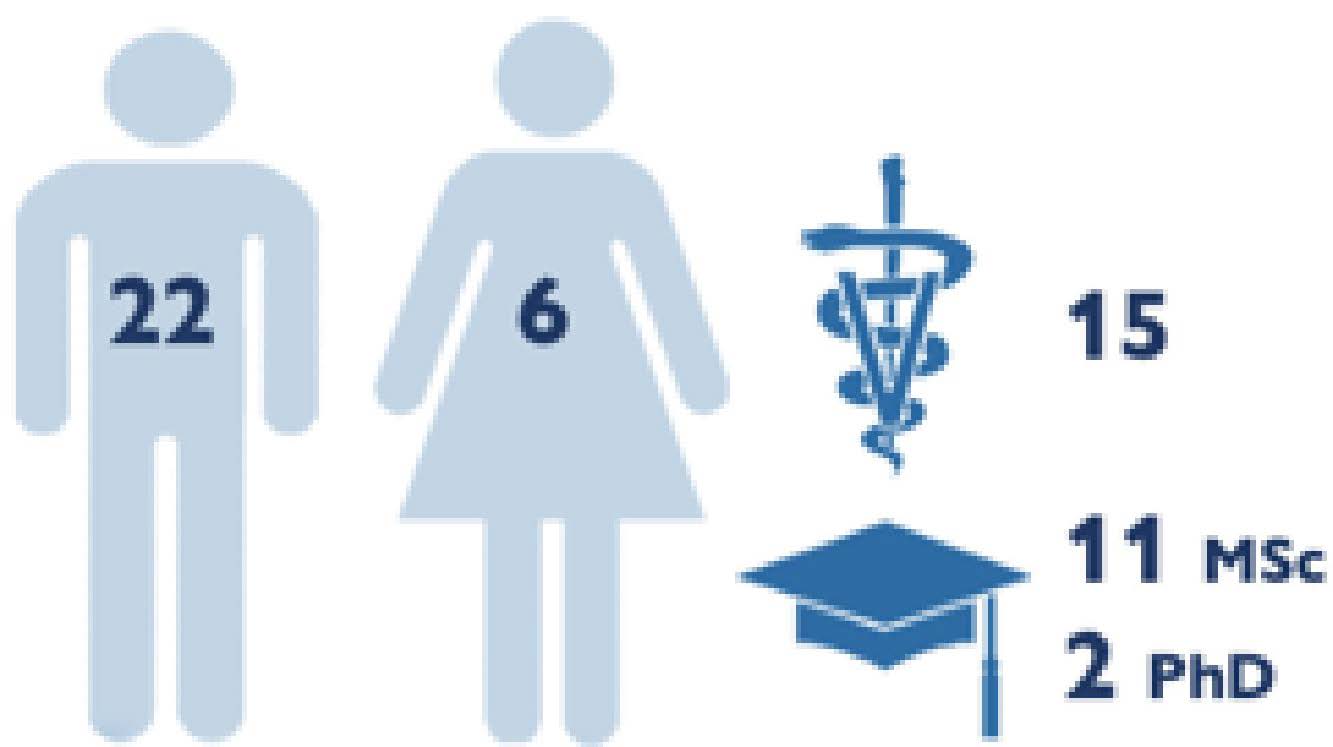
The Next Generation of Livestock Disease Researchers
From the beginning, the YSM project focused on capacity building and training of graduate and veterinary students. In a win-win situation, students gained valuable field, laboratory, and project experience required for their degree programs, and they fueled the project’s productivity. The project obtained data from 3,500 animals and from more than 1,000 households.
Since 2016, the project’s student researchers have built new skills through regular workshops, field visits, training opportunities and virtual communication. Upon graduating, they are better prepared to enter the Ethiopian workforce as veterinarians and livestock disease researchers. At least 10 graduates are already employed in their field, and for many it represents their first full time job.
In November 2019 the project hosted a Data Analysis Workshop for 13 affiliated graduate students. Over the course of 3 days, the students shared their research findings with each other and worked together in teams to aggregate their data sets and begin the process of writing manuscripts. Topics covered included selecting a journal, manuscript writing, data cleaning and validation, and data analysis. For each student, mentors reviewed their final data sets, test results, and manuscripts, discussed shortcomings and challenges with data interpretation, and worked together on aggregating data sets and findings across multiple projects and geographic locations.
Student Alumni
Several alumni of the project have shared their experiences and their career paths. The profiles below represent a few of the 28 students involved.
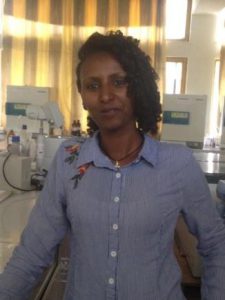 Fikirte Geberie, a recent veterinary graduate from the University of Gondar, focused her research project on diarrheal pathogens in peri-urban dairy calves in Gondar. In particular, she focused on the molecular characterization and antimicrobial resistance of Salmonella. She is now working as a Veterinary Officer for the Department of Agriculture, Central Gondar Zone.
Fikirte Geberie, a recent veterinary graduate from the University of Gondar, focused her research project on diarrheal pathogens in peri-urban dairy calves in Gondar. In particular, she focused on the molecular characterization and antimicrobial resistance of Salmonella. She is now working as a Veterinary Officer for the Department of Agriculture, Central Gondar Zone.
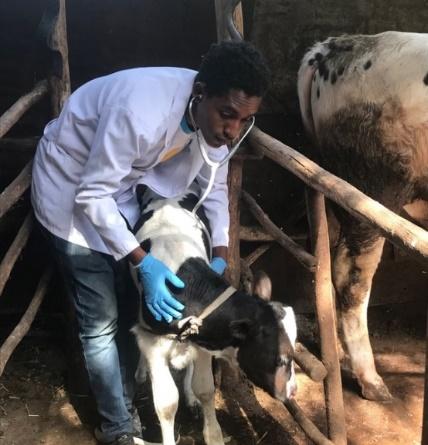 Ayenalem Shibabaw, a 2019 University of Gondar veterinary school graduate, is now a lecturer in Animal Health at Alage Technical and Vocational Education and Training College. He reports that he gained valuable experience in communication, physical exams, sample collection, and laboratory testing in his project, which focused on respiratory diseases in calves in Gondar. He plans to continue in research and to apply his new knowledge on managing the health of young stock to help farmers to improve animal husbandry, and management and colostrum feeding practices.
Ayenalem Shibabaw, a 2019 University of Gondar veterinary school graduate, is now a lecturer in Animal Health at Alage Technical and Vocational Education and Training College. He reports that he gained valuable experience in communication, physical exams, sample collection, and laboratory testing in his project, which focused on respiratory diseases in calves in Gondar. He plans to continue in research and to apply his new knowledge on managing the health of young stock to help farmers to improve animal husbandry, and management and colostrum feeding practices.
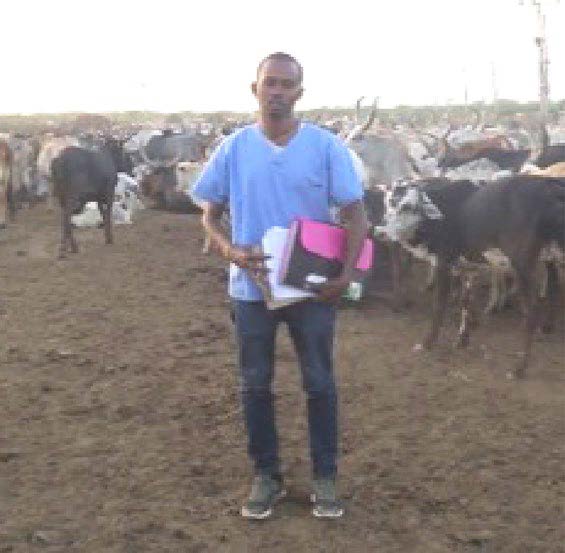
Erdachew Yitagesu Tesema joined the YSM project in 2017 as an MSc student, focused on Bovine Viral Diarrhea Virus infection in cattle in peri-urban, mixed crop and pastoral production systems. He now works as an Assistant Researcher at the Debre Birhan Agricultural Research Center in North Shoa, Ethiopia. He cites experience gained, such as conducting fieldwork in remote and varied Ethiopian production systems and sample collection and testing, as invaluable to his professional growth. He shared:
Participating with the YSM project strongly helped me achieve my career goals, and I developed valuable skills in research planning, fieldwork, and manuscript preparation. I’m now working on a project investigating calf health and economic impacts in the Debre Birhan milk shed. We are also proposing projects including an evaluation of breed, health, feed improvements on dairy production as well as implementing evidence based deworming strategies to reduce anthelmintic resistance in sheep and cattle.
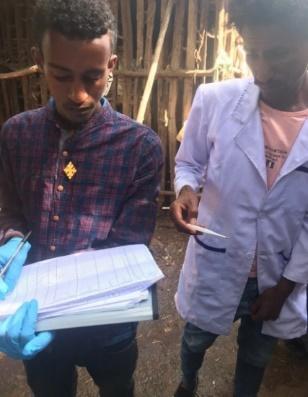 Lijalem Genetu Senay, a recent veterinary graduate from the University of Gondar, focused his research project on diarrheal pathogens in peri-urban dairy calves in Gondar. Since graduation, he has started working as a veterinary officer at Ethiochicken, a private company focused on poultry production. He says the YSM project taught him how to collect and interpret data and write scientific papers. He is looking forward to working with a research center in the future, focusing on poultry breeding and economic analysis research.
Lijalem Genetu Senay, a recent veterinary graduate from the University of Gondar, focused his research project on diarrheal pathogens in peri-urban dairy calves in Gondar. Since graduation, he has started working as a veterinary officer at Ethiochicken, a private company focused on poultry production. He says the YSM project taught him how to collect and interpret data and write scientific papers. He is looking forward to working with a research center in the future, focusing on poultry breeding and economic analysis research.
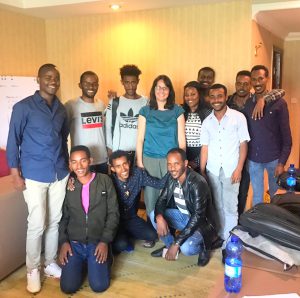
Dr. Gema Vidal is a co-principal investigator from the University of California, Davis. “I have been involved with the project since its early stages and I have walked in my career path as researcher in parallel with this project. It has exposed me to project management, leadership, and teaching opportunities, and I have learned about Ethiopian dairy production challenges and culture. I will be using the skills learned in my next career step, where I would like to work with evidence-based interventions that improve food security and peoples’ livelihoods.”
The Future
Following graduation, YSM alumni have gone on to work around Ethiopia in livestock, research, and education sectors. These include instructor positions at universities and technical colleges, working as veterinary officers with regional Departments of Agriculture and private sector poultry producers, and serving as research officers in Regional Veterinary Diagnostic Laboratories. Excited and eager to make a difference, these new professionals are valuable additions to the Ethiopian workforce.
 0
0
